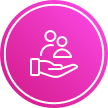.jpg)
Council For Economic Education
The Council for Economic Education’s (CEE’s) mission is to equip K-12 students with the tools and knowledge of personal finance and economics so that they can make better decisions for themselves, their families, and their communities.
We carry out our mission by providing resources and training to K-12 educators and have done so for over 70 years. Nearly two-thirds of the teachers we reach in-person are in low to moderate income schools. All resources and programs are developed by educators and delivered by our 188 affiliates across the country in every state. We reach over 50,000 teachers a year through in-person professional development and those teachers, in turn, reach approximately 5 million students throughout the country. EconEdLink, our free online educator gateway for economic and personal finance lessons and resources, attracts more than 700,000 unique visitors per year. We also advocate for more education in personal finance and economics through our Survey of the States.
FINANCIAL IGNORANCE IS NOT AN OPTION
If the goal of high school is to prepare students for life after graduation, then most schools in our country are not meeting that standard. While our school system prepares students with the academic skills needed to succeed, there is one glaring flaw: most students graduate with next to no knowledge on managing finances.
Money-management skills are more important than ever to navigate the economic realities of the modern marketplace, yet most states still do not require high schools to offer personal finance classes. In lieu of high school personal finance classes, most teens either learn from their mistakes or look to parents for personal finance lessons. Unfortunately, not all parents are well-equipped to serve as financial models for their children.
To address this growing national problem, a group of students from Lexington, Massachusetts founded Project Finance, an organization to promote financial literacy in high schools. We distributed a survey to all public high schools across the state and found an absence of universally accepted financial literacy standards across the Commonwealth. As such, Project Finance has been pushing for the adoption of financial literacy standards, and in March 2017 successfully requested the State Board of Education to review the Council for Economic Education’s National Standards for Financial Literacy for implementation into the state curriculum. This is only a start; offering a personal finance class in each high school is the necessary next step to prepare our students to become informed consumers, investors and participants in our global economy.
Being financially literate cannot guarantee future success, but the personal and national costs of being financially ignorant are immense. My generation is being academically prepared for life after graduation; it is now time for us to be financially prepared.
RYAN LEUNG, Past Champion of the National Economics Challenge
Financials
Programs
Invest in Girls
Invest in Girls' mission is to usher in the first generation of financially literate girls, and to change the way girls interact with money. By providing high school girls with personal finance workshops, financial services industry trips, and a Role Model Exchange, we allow them greater access to strong financial futures and rewarding careers.
Family Financial Literacy Nights
At Family Financial Literacy Nights, students and their families come together for a fun evening to learn the basics of personal finance. These after-school activities create an open dialogue about topics such as saving, spending, and budgeting, topics that are not often discussed at home.
New York Center for Economic and Financial Education (the Center)
We are investing in professional development. We reach 4,000 NYC teachers through the Center annually, nearly 75% of whom teach in Title 1 schools.
National Economics Challenge and National Personal Finance Challenge
The National Economics Challenge, in which over 10,000 students from the US and 2,300 students from China participated this year, is the only competition of its kind. It tests micro and macroeconomic principles as well as knowledge of the world economy. Through written exams, presentation-based critical thinking rounds, and on-stage quiz bowls, students compete for the national championship.
The National Personal Finance Challenge, with over 18,000 student participants this year, provides middle and high school students with an exciting and motivating opportunity to build, apply, and demonstrate their knowledge of this important subject. Through written exams and personal finance simulations, teams showcase their budgeting, investing, planning, and decision making skills.


